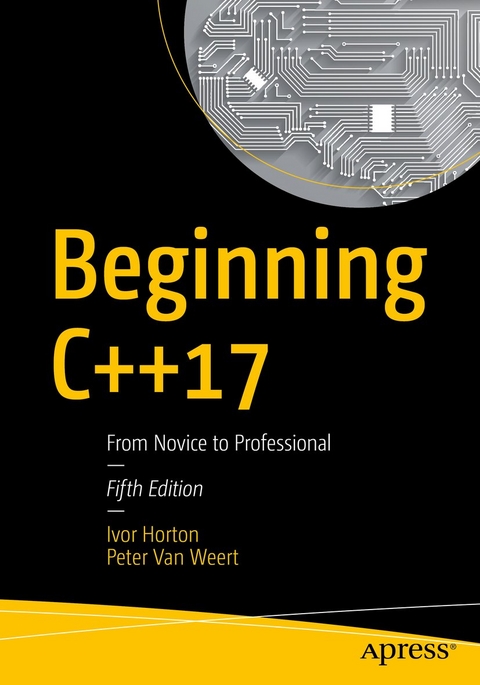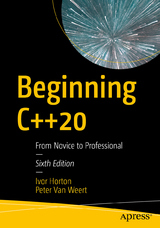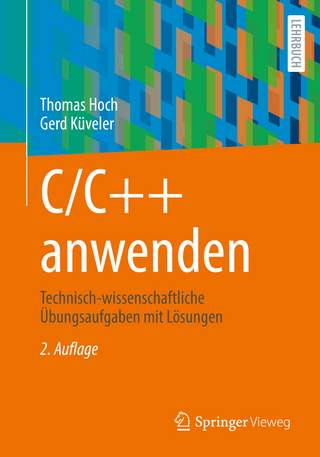
Beginning C++17
Apress (Verlag)
978-1-4842-3365-8 (ISBN)
- Titel erscheint in neuer Auflage
- Artikel merken
All language concepts that are explained in the book are illustrated with working program examples, and all chapters include exercises for you to test and practice your knowledge. Code downloads are provided for all examples from the text and solutions to the exercises.
This latest edition has been fully updated to the latest version of the language, C++17, and to all conventions and best practices of so-called modern C++. Beginning C++17 also introduces the elements of the C++ Standard Library that provide essential support for the C++17 language.
What You'll Learn
Define variables and make decisions
Work with arrays and loops, pointers and references, strings, and more
Write your own functions, types, and operators
Discover the essentials of object-oriented programming
Use overloading, inheritance, virtual functions and polymorphism
Write generic function templates and class templates
Get up to date with modern C++ features: auto type declarations, move semantics, lambda expressions, and more
Examine the new additions to C++17
Who This Book Is For
Programmers new to C++ and those who may be looking for a refresh primer on the C++17 programming language in general.
Ivor Horton is self-employed in consultancy and writes programming tutorials. He is the author of many programming books. Ivor worked for IBM for many years and holds a bachelor's degree, with honors, in mathematics. Horton's experience at IBM includes programming in most languages (like assembler and high-level languages on a variety of machines), real-time programming, and designing and implementing real-time closed loop industrial control systems. He has extensive experience teaching programming to engineers and scientists (Fortran, PL/1, APL, etc.). Horton is an expert in mechanical, process, and electronic CAD systems; mechanical CAM systems; and DNC/CNC systems. Peter Van Weert is a Belgian software engineer whose main interests and expertise are application software development, programming languages, algorithms, and data structures. He received his master of science degree in computer science summa cum laude with congratulations of the Board of Examiners from the University of Leuven. In 2010, he completed his PhD thesis there on the design and efficient compilation of rule-based programming languages at the research group for declarative programming languages and artificial intelligence. During his doctoral studies, he was a teaching assistant for object-oriented programming (Java), software analysis and design, and declarative programming. After graduating, Peter worked at Nikon Metrology for more than six years on large-scale, industrial application software in the area of 3D laser scanning and point cloud inspection. He learned to master C++ and refactoring and debugging of very large code bases, and he gained further proficiency in all aspects of the software development process, including the analysis of functional and technical requirements, and agile and scrum-based project and team management. Today, Peter works for Danaher in its R&D unit for digital dentistry software, developing software for the dental practice of tomorrow. In his spare time, he has co-authored two books on C++ and two award-winning Windows 8 apps and is a regular expert speaker at, and board member of, the Belgian C++ Users Group.
1. Basic Ideas.- 2. Introducing Fundamental Types of Data.- 3. Working Fundamental Types.- 4. Making Decisions.- 5. Arrays and Loops.- 6. Pointers and References.- 7. Working with Strings.- 8. Defining Functions.- 9. Function Templates.- 10. Program Files and Preprocessing Directives.- 11. Defining your own Data Types.- 12. Operator Overloading.- 13. Inheritance.- 14. Virtual Functions and Polymorphism.- 15. Runtime Errors and Exceptions.- 16. Class Templates.- 17. Move Semantics.- 18. First-Class Functions.- 19. Containers and Algorithms.
| Erscheinungsdatum | 10.04.2018 |
|---|---|
| Zusatzinfo | 82 Illustrations, black and white; XXVIII, 771 p. 82 illus. |
| Verlagsort | Berkley |
| Sprache | englisch |
| Maße | 178 x 254 mm |
| Gewicht | 1502 g |
| Themenwelt | Informatik ► Programmiersprachen / -werkzeuge ► C / C++ |
| Informatik ► Theorie / Studium ► Compilerbau | |
| Schlagworte | C++ • C++ 17 • Code • Ivor Horton • programming • Software • Tutorial |
| ISBN-10 | 1-4842-3365-4 / 1484233654 |
| ISBN-13 | 978-1-4842-3365-8 / 9781484233658 |
| Zustand | Neuware |
| Haben Sie eine Frage zum Produkt? |
aus dem Bereich



